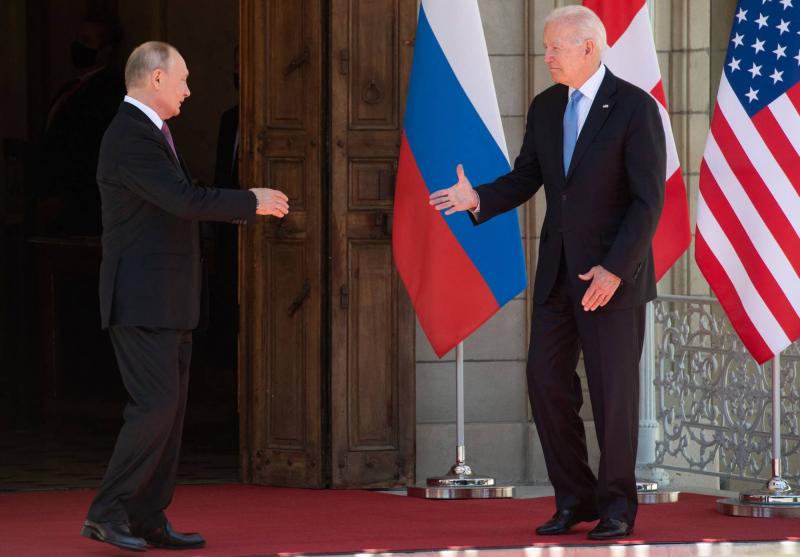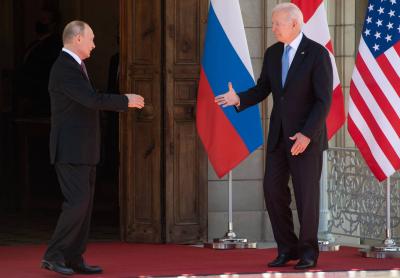After months of tension in the relationship between Washington and Moscow, U.S. President Joe Biden and Russian President Vladimir Putin sat down together in Geneva on Wednesday for their first summit, which may not be the last. However, opinions differ on evaluating the outcomes concerning the future of relations between the world's two strongest military powers. Biden had adopted a firm tone since taking office at the beginning of the year regarding his Russian counterpart, describing him as a "killer" several months ago. Nevertheless, what occurred on Wednesday was an attempt to de-escalate differences with Russia and find grounds for understanding.
After the summit, Biden stated that "four hours of dialogue were positive," adding that there would be "devastating consequences for Russia" if opposition leader Alexei Navalny were to die. In a press conference, Biden mentioned that the reason the summit ended earlier than planned was that the dialogue was direct at the table, and there was no need for more time. "We talked for two hours in detail, and we didn't need any more time." He described the meeting as frank and confirmed that they discussed several issues, including the Russian opposition, the arms reduction treaty, cybersecurity, the Syrian issue, the Iranian nuclear file, and Ukraine.
Conversely, Putin, who held his press conference before Biden, considered his first direct meeting with the U.S. president to be "very constructive" and announced that they agreed to consult on cybersecurity. The summit's proceedings drew mixed reactions, with some labeling the meeting a failure. However, Hassan Mneimneh, a writer at the Washington Institute for Near East Policy, believes the U.S.-Russian summit "succeeded because Biden managed to take steps to correct the relationship between the two countries."
Mneimneh explained that the Biden-Putin meeting came against the backdrop of former President Donald Trump's administration neglecting the relationship with Russia and appearing submissive to Putin's will. He added that unlike Trump, Biden expressed a desire for a good relationship with Russia and to correct the abnormal situation, which he achieved today. Referencing Putin's statement that the summit was "constructive," Mneimneh remarked, "This means there is a conviction on both sides that the relationship has become clearer, more candid, and potentially more effective."
Hudson Institute researcher Michael Bergholt expressed the belief that the White House achieved little from the summit with Putin, stating that "the lack of American preconditions before the summit is a concession... the meeting itself is a concession." He added that "President Biden should have stated he wouldn't meet with Putin unless there were solutions to the cybersecurity attacks and a rollback of Russian actions at the Ukrainian border." The American researcher concluded that "Moscow rejects all U.S. proposals, whether related to Ukraine, Syria, or other files, and therefore it is unclear what Washington aims to achieve by holding this summit."
Days before the summit, Biden promised to outline to Putin what the "red lines" were that Moscow should not cross. He stated at the end of the NATO summit in Brussels, "We are not seeking conflict with Russia, but we will respond if Russia continues its activities." In this context, Mneimneh noted, "We should not expect this meeting to represent a substantial change in the details of the relations between Washington and Moscow." He added, "The summit will lay the groundwork for a tangible change in the direction of relations, which is significant because the meeting will establish a more equitable relationship and perhaps more between the two countries."
Mneimneh believes that the summit "will place President Putin before the reality that Russia will no longer be able to act as it does today without consequences." He continued, "Overall, the purpose of the summit was not to address all files but rather to attempt to convey to Russia, and particularly to Putin, that from now on, the relationship will not tolerate Russian transgressions."
As a sign of de-escalation between the two sides, Putin announced that he and Biden agreed to return their ambassadors after they were previously summoned earlier in the year. Putin also noted the possibility of reaching "settlements" for prisoner exchanges. The two leaders agreed to hold a dialogue on "cybersecurity," one of the main contentious issues between the two countries.
Russian analyst Leonid Sukhainen stated that "the internal Russian community paid great attention to the summit because it came after U.S.-Russian relations reached the lowest level not seen even during the Cold War." He added that the deterioration in relations between Washington and Moscow significantly affected not only the political and economic interests of Russia and the United States but also the world at large. Sukhainen describes the Geneva summit as "a first step forward, even if by a millimeter."
He commented on the "red lines" set by Biden before the summit by saying that "these lines exist for us and for the Americans too, and everyone must respect them, and they are open to discussion." He continued, "Russia acknowledges the United States' lines, but only on the condition that Moscow's lines are recognized as well."
Relations between the United States and Russia have deteriorated over the years, especially after Moscow's annexation of Crimea from Ukraine and its intervention in Syria in 2015, along with U.S. accusations—denied by Moscow—of interference in the 2016 U.S. presidential election. The relationship worsened further in March when Biden stated he believed that Putin was a "killer," leading Russia to summon its ambassador to Washington for consultations. The United States summoned its ambassador in Moscow in April.
For Ilan Berman, Vice President of the American Foreign Policy Council, the summit was significant because it "allowed Biden to raise a number of critical issues, including cyber warfare and human rights, and to begin to define some problems in U.S.-Russia relations." However, Berman, an expert in regional security for the Middle East, Central Asia, and the Russian Federation, noted, "It is also clear that the summit did not achieve Biden's original goal of resetting bilateral relations with Russia."
Berman stated in an interview with "Al-Hurra" that the developments following the summit indicate that the Kremlin has a better understanding of the United States' "red lines," and that Washington is ready to respond vigorously if Moscow does not change its behavior.
Max Brigham from the Center for American Progress agrees, stating that "the real test is whether Russia will change its behavior and reduce its aggressive actions against the United States and Europe." Conversely, Brigham rejected the characterization of the Biden-Putin meeting as a "summit," viewing it merely as a "meeting." He added that neither side "expected to achieve much because there is currently limited room for cooperation between the United States and Russia," noting that the U.S. aimed to "de-escalate relations and set clear red lines with Russia." He also believes that as a result, the outcomes were modest but likely beneficial and important, especially regarding the resumption of nuclear talks and the return of ambassadors.




